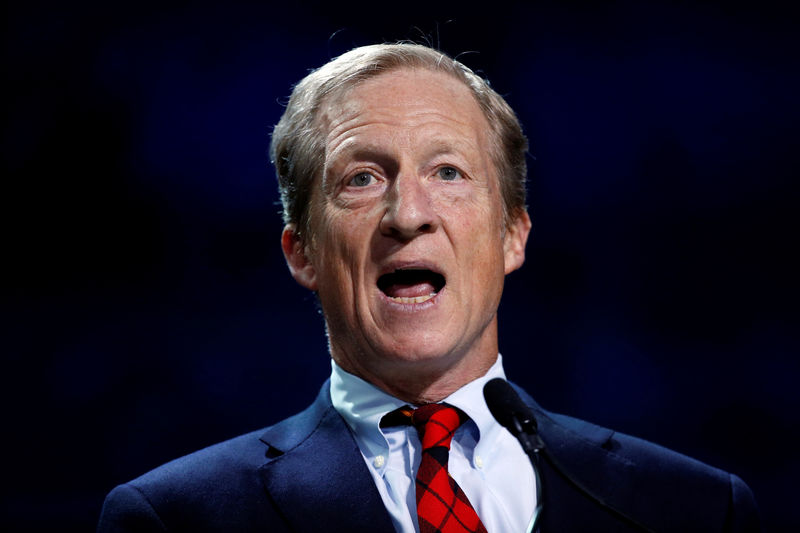By Sharon Bernstein
SACRAMENTO, Calif. (Reuters) - Billionaire Tom Steyer, a longtime friend and key donor to liberal candidates and causes, says he decided to run for the Democratic presidential nomination next year because no other candidate was offering a "mandate for change".
But by deciding to fund his long-shot bid with $100 million of his own money, some Democratic activists believe all he will end up doing is denying his money to grassroots organizations and candidates in Senate and House races that Democrats are desperate to win.
Steyer's political bona fides and passion are not in question. He has worked for years on issues of climate change and voter engagement and donated about $170 million since 2015 to his independent political action committees, Need to Impeach and NextGen America.
During the 2017-2018 election cycle, he was the second-largest donor to Democratic and liberal candidates and causes, according to the Center for Responsive Politics.
The 62-year-old former hedge fund manager from San Francisco is not well-known beyond political circles, however, and most self-funded candidacies fail. He also joins a field that numbers more than 20 candidates, currently led by former Vice President Joe Biden and U.S. Senators Bernie Sanders, Kamala Harris and Elizabeth Warren.
"Every dollar he spends on himself is a dollar that's not going into something that can make a difference," said California Democratic campaign consultant Steven Maviglio, who worked with Steyer in 2010 to defeat a ballot measure aimed at weakening the state's greenhouse gas emissions law.
Democrats face high stakes in November 2020 to defeat Republican President Donald Trump, hold on to their new majority in the U.S. House of Representatives and pick up seats in the Senate.
The money Steyer plans to spend on his own campaign could fund five Senate elections, which the Center for Responsive Politics says cost $19.4 million apiece to win in 2016.
"The influence he is going to have on the campaign is probably to rob candidates farther down the ballot of the ability to raise the kind of money they need," said Sherry Bebitch Jeffe, a retired University of Southern (NYSE:SO) California public policy professor.
'WE'RE IN A CRISIS'
Steyer's efforts are credited with helping Democrats make inroads in swing states and conservative areas, and his involvement helped propel Andrew Gillum's insurgent albeit unsuccessful campaign for Florida's governorship last year.
He has been a vocal supporter of efforts to impeach Trump.
He told Reuters he decided to announce his bid on July 9 because he was frustrated with the Democratic candidates when so much was at stake.
"I was watching this campaign and I was thinking, we're in a crisis and it's not being addressed," Steyer said in a phone interview. "I couldn't sleep because I thought there was something desperately wrong affecting every American."
The leaders in the field are Washington insiders too beholden to the system to effect change in the areas he believes are crucial, such as campaign finance reform, congressional term limits and regulations to fight climate change, Steyer said.
"In order for this to be a successful election we don't need to just beat Donald Trump – we need a broad mandate for change," he said.
Instead, the candidates were getting bogged down arguing about the details of their policy proposals.
"The question is not who has the best healthcare plan," he said. "The question is whether any of it is going to happen."
Steyer has promised to contribute $50 million to Need to Impeach and NextGen America even as he funds his own campaign.
But many activists may still be frustrated by his decision to spend so much on himself, said Raphael Sonenshein, director of the Pat Brown Institute for Public Affairs at California State University, Los Angeles.

"What's going to stand out for Democrats is his promise to spend tens of millions of dollars on his own presidential campaign. That's not going to be very popular," Sonenshein said.